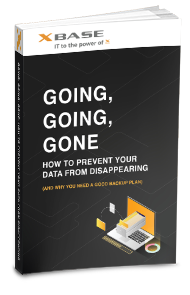As a business owner, you know that an effective backup and disaster recovery (BDR) strategy is crucial to securing your organization's data in the event of any disaster. But what you may not realize is that a managed IT services provider (MSP) can be a valuable partner in creating and implementing your BDR strategy.
Here's a look at some ways an MSP can help with backing up and recovering data.
1. Data classification
An MSP can help you classify your data so that you can determine which needs to be backed up, how, and how often. There are four typical data classifications:
- Public data – accessible to anyone
- Internal data – accessible to limited employees who have been granted access
- Confidential data – only accessible to a select few; requires authorization and clearance
- Restricted data – unauthorized access could lead to significant legal penalties or irreversible damage to the company
MSPs will first classify your data to understand what level of security needs to be applied to specific files. They will then back up your data into different storage media according to the security classification, and make sure that authorized users have access to everything they need. MSPs also regularly test these backups to ensure that they can be accessed in the event of a catastrophe.
2. Expertise
Most MSPs have created, tested, and rolled out multiple successful BDR plans. Hence, they have the expertise to make a BDR strategy that’s not only effective but also suited to your specific business needs. They can also provide crucial advice on which type of backup solution is best for your business. For example, they may recommend that you get an enterprise-level solution if you need to make copies of vast amounts of data, or otherwise get a simple cloud-based backup solution if you only have a small data set to make copies of.
On top of helping you make the right choices, an MSP can also warn you about backup and recovery mistakes to avoid.
3. Data security education
MSPs can provide employee training on data security best practices, such as setting strong passwords, staying away from potentially malware-laden sites, and not downloading suspicious attachments.
Some MSPs can simulate a cyberattack to help your organization identify strengths and areas for improvement. This allows you to fortify your cyber defence against actual attacks.
For instance, rather than wait for an actual phishing email, MSPs can hold a phishing simulation to test everyone's awareness and/or check the effectiveness of your phishing training. They can then reward those who reported it immediately while providing a refresher course on how to spot these scams for those who failed the exercise.
4. Ease of management
An MSP can manage your backup and disaster recovery solution for you, taking some load off of your IT staff and freeing them up to focus on their primary tasks.
For one, MSPs can determine your recovery point objective and recovery time objective and then implement the right backup and recovery solutions based on this information. They can do all this with little to no supervision, so you can keep running your business without worry, knowing your BDR plan is in safe hands.
5. Single point of contact
Besides providing BDR solutions, most MSPs can also help you with other IT needs, such as cloud computing, virtualization, and more. If you get all or most of the IT services you need from a single provider, you can simplify your IT infrastructure, increase efficiency, and save time and money.
And by having a single point of contact for your tech, it's easier to monitor and manage your overall IT environment. This is because your MSP can give you a comprehensive view of your IT infrastructure, rather than trying to piece it together yourself from multiple different vendors.
These are just some of the ways an MSP can help your business’s backup and disaster recovery strategy. Learn more about how you can keep your data safe by reading our eBook, ‘Going, going, gone: How to prevent your data from disappearing (and why you need a good backup plan).’ Get your FREE copy now!
Download our FREE eBook!
Learn what other firms had to discover the hard way by not mitigating data loss.

